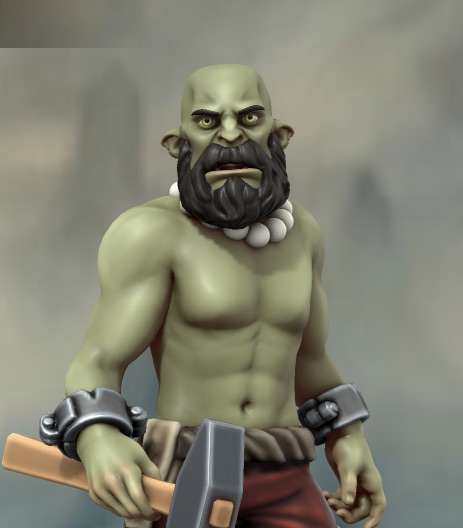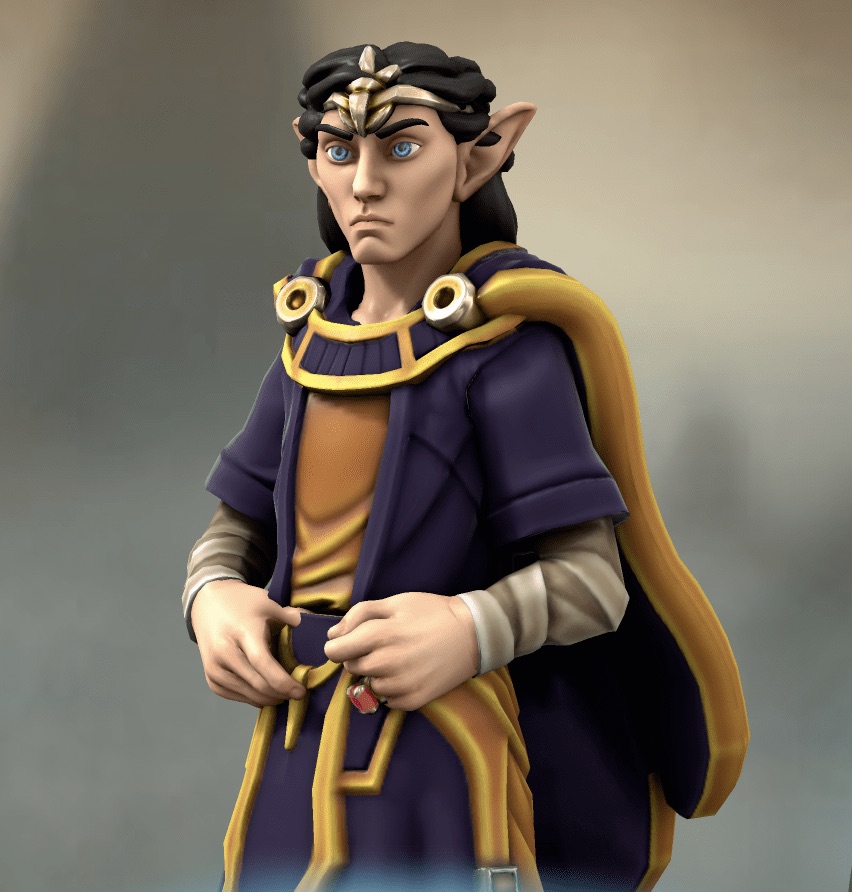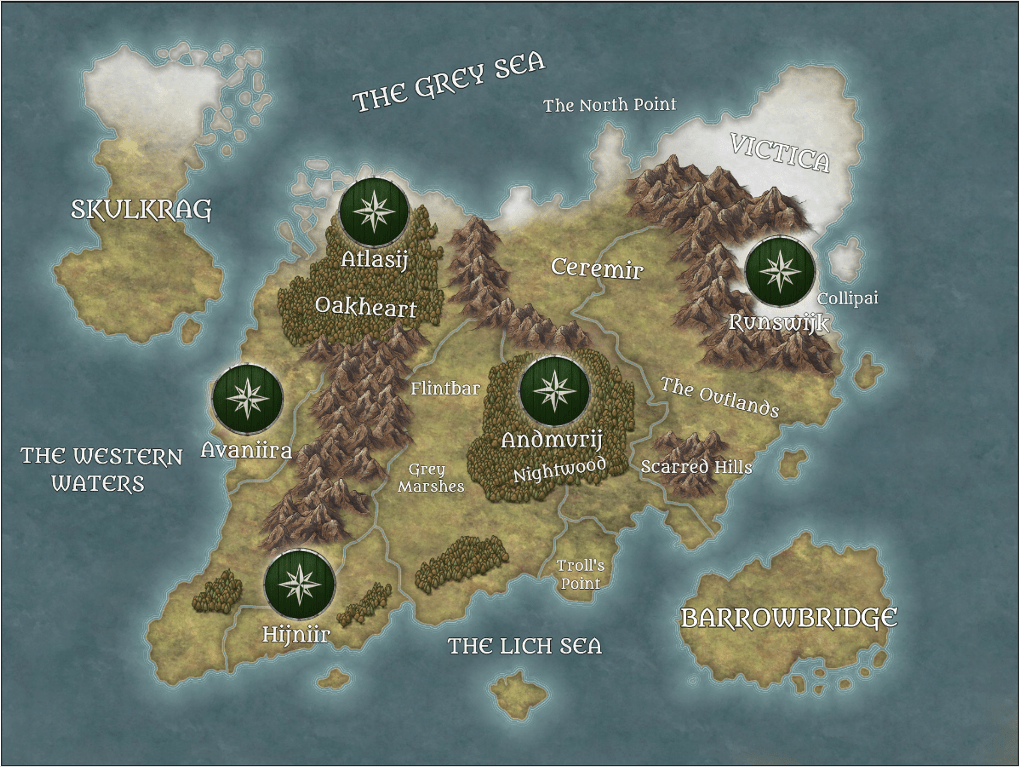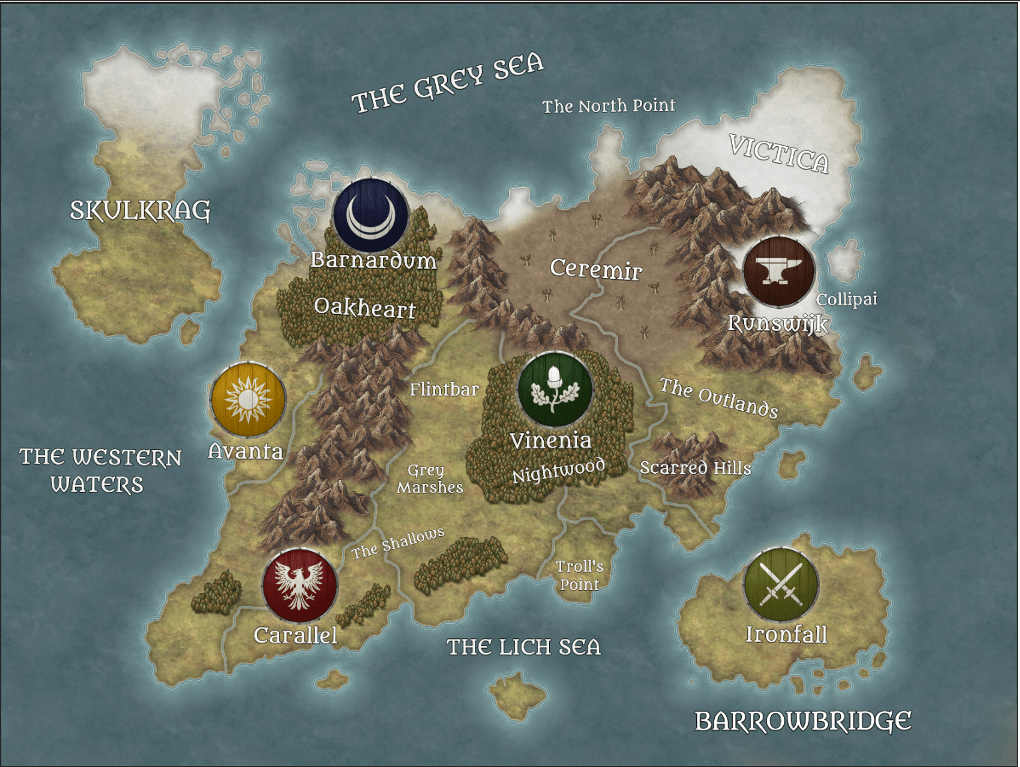Azhug the Righteous
Fig 1: Azhug the Righteous, made on Heroforge
Azhug the Righteous, born in 2556 of the Domijn Era, grew up in an orc tribe, somewhere in the south of Ceremir. He lived in the time where Derelador was under the rule of the Archimentus Empire, where the Elven emperor's influence governed his home. From a young age, his father taught him to never step out of line, to only speak when spoken to, and to not question the rule of the Elves. His mother opposed his teachings, telling Azhug that as an orc it was his duty to defend those who couldn't defend themselves, and to stand against injustice. For most of his life, Azhug lived following his father's advice, and followed the laws of the Empire.
When he turned 18, he joined the Empire's military, which his mother opposed. She would have preferred that her son would have stuck with tradition, and become a warrior of the tribe. She saw the Empire as a way of imprisoning her people's freedom. But Azhug was proud to be serving under the regime. He had been told stories of the Lesser Elves by his father, and was excited to be playing his part in the Empire.
However, when the previous Emperor passed away, he was replaced by his son, Lucius I. When he was made Emperor, Lucius made it his first act to restrict religious freedom to the orcs, who he saw as "barbaric savages." A law was passed in 2580 that prohibited any Orcish religious practices, and that if any individual, of any race, was found to be worshiping in secret, they to be punished with severe penalties. Azhug did not take much notice of this, as he was not strictly religious as his family from the tribe, and so he continued his duty as normal.
Fig 2: Emperor Lucius I, made on Heroforge
That was, until tragedy struck. Azhug retired from the military when he reached 30, and returned home to greet his family. To his horror, he found his tribe's home in ruins. He was told that his mother had opposed the regime, and was discovered to have been worshipping in secret. As a punishment, she and the whole tribe had been killed, and the their home had been burnt to the ground. Azhug was grief stricken, and he realised that the Empire was not what he had always seen it as. His people needed justice.
As he mourned the death of his family, Azhug remembered his mother's teachings. As the last member of his tribe, he saw it as his duty to avenge his family's death, and to protect those who were o suffer the same fate. His father had taught him to respect the Empire, but now, he saw no need to respect an Empire that terrorised its people. He swore to never stop fighting for justice, for his people's freedom, even if it meant having to face death itself.
He travelled across Ceremir, calling other orcs to aid his cause, telling them of the slaughter he had witnessed. Soon, what had started as a handful of orcs became an entire force of freedom fighters, all fighting for the same cause: To refuse the Empire's laws until they were made fair for all. Under Azhug's command, secret places of worship were set up in hidden locations, where orcs could find a safe place to practice their beliefs. These were set up all across Ceremir, all hidden from the Empire's sight. After two years of secretly worshipping, one of these sites was uncovered, and Azhug and many of his followers were sent to prison. The orcs protested in jail, which resulted in violent conflicts between the guards and prisoners. When this escalated, Azhug and his followers broke themselves out of jail, losing several members in the struggle.
Azhug returned home a hero in 2583, and now had more followers than ever before. They began harassing the Empire's guards situated in Ceremir, which led to a need for more forces in those areas. Lucius was running low on soldiers, and so raised taxes in the dwarven province of Runsvijk, which led to angry boycotts from those who refused to pay. Due to the boycotts, Lucius forced to withdraw his troops from Ceremir to move them to Runsvijk, resulting in less security in Ceremir. Now, there were practically no forces stopping Azhug and the orcs from any further assaults.
Azhug took advantage of this, and plotted a full scale invasion of the Empire's capital, Andmurij. His intent was to storm the Emperor's Palace, confront Lucius, and force him to change the law. He did not intend to harm civilians, but if force was needed to get their way, he was willing to act upon it. He is said to have stated "When a tear drop does not make change, a drop of blood will."
In 2584, however, Azhug's plans were delayed when he heard news of a band of his followers, one of which was his sister, having been captured by the Emperor's soldiers. They had been brought to Emperor Lucius in Andmurij, and were scheduled to be executed. Execution had been banned by Lucius' grandfather when he was Emperor, but Lucius had reinstalled it, saying that "These activists threaten the peace of our Empire, and so we must take drastic measures to be rid of them."
According to legend, Azhug sent a message to the Emperor, telling him that he will surrender himself to the Empire if the prisoners are allowed to be set free. Lucius, despite his advisor's suggestions otherwise, accepted immediately, wishing to be rid of the ringleader. So, Azhug rode to Andmurij upon a pack horse, on his own, and his sister and followers were set free, as had been agreed. He himself was taken into imprisonment, and was scheduled to be executed by hanging the following week.
As the rope was placed around his neck, Azhug told the crowd "I die today, but the people I led will continue to fight for what they believe in, no matter how many lives you take. Their spirit and will continue to live on." That day, Azhug, finally met his end, a martyr of his faith.
But what he said was right. A year later, Azhug's sister led the assault on the Emperor's Palace in Andmurij. The total number of deaths is unknown, but many of the orc followers fell that day. Emperor Lucius was captured, and with a dagger at his throat, he was forced to pass a law allowing religious freedom to all faiths.
A few years later, Lucius died, and his son was handed a crumbling Empire. It wasn't long before the Archimentus Empire, which had ruled for almost three centuries, disappeared completely. And many believe that Azhug's act was one of the key events that led to its downfall.
Fig 3: The Empire at the height of Lucius' reign (Map made on Inkarnate, and edited in Powerpoint)
Fig 4: Derelador, several centuries after the Archimentus' Empire's downfall. All the Elven cities have all become human, dwarven and elven territories. (Map made on Inkarnate, and edited in Powerpoint)
For a long time after his death, Azhug was antagonised, mostly by elves, and his fight for freedom was depicted as a bloody campaign of terror. However, as time passed, scholars and historians began to explore his story more, and many came to the conclusion that Azhug's impact on the world changed things for the better. Religious tolerance had greatly improved since his demise, and more importantly, his ideas of standing against oppression for the greater good changed how many saw the ideas of government.
In fact, the Republic of Avanta, which had once been part of the Empire, established their democracy partly due to his influence. Even a statue commemorating his legacy was temporarily built there, though it was taken down within a few years.
Azhug did not fight for power. Nor did he fight for riches. The sacrifices he made seemed irrational. He fought for what was right, which gained him the title Azhug mur Kuretha, which translates into common tongue, Azhug the Righteous.
Children
Remove these ads. Join the Worldbuilders Guild












Comments